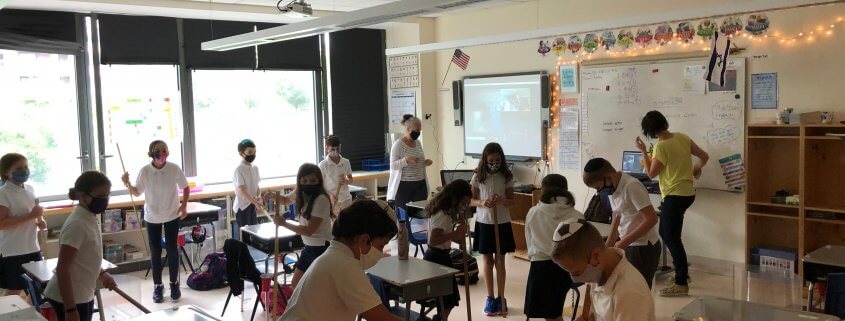Communal Responsibility this Rosh Hashana: Follow Public Health and Safety Guidelines
Communal Responsibility this Rosh Hashana: Follow Public Health and Safety Guidelines
As most years, students at Schechter Manhattan spent time during the first days of school learning about and preparing for the upcoming Jewish holidays and new Jewish year. Rosh Hashanah this year will surely feel different than ever before, as we approach the holiday season in the midst of the COVID-19 pandemic. Even in this unusual year, I believe that a central message of the high holidays is our mutual responsibility for one another, a timeless value that we are called on to live out in very tangible ways right now.
A highlight of the Rosh Hashanah service is unetaneh tokef, a liturgical poem from 13th century Germany, that asks us to face the fear of not knowing what will come in the year ahead. In the climactic centerpiece of the prayer the congregation calls out aloud…
וּתְשׁוּבָה וּתְפִלָּה וּצְדָקָה מַעֲבִירִין אֶת רֽוֹעַ הַגְּזֵרָה
But teshuvah, reflection and repentance, and t’filah, prayer, and tzedakah, acts of charity, lessen the badness of the decree.
This is the traditional response to facing the fear of the unknown. תְשׁוּבָה וּתְפִלָּה וּצְדָקָה- teshuvah, t’filah, and tzedakah. These are the things we can and should do to make our lives better in the year ahead. Each of them, in their own way, call on us to support and care for one another.
Teshuvah is a process of self-reflection and change. We are compelled to ask ourselves questions- not about what may happen in the future, but what we did in the past. We are called to do a deep investigation of ourselves, a heshbon hanefesh, a personal accounting, that leads to personal responsibility. We are expected to reach out to those we have hurt and make amends. We have it in our power to do better, to improve ourselves, and by extension to improve the lives of those around us.
T’filah acknowledges that even as we take personal responsibility, we are not able to succeed alone. Jewish prayer is both personal and communal. The holiest sections of the Jewish liturgy, the devarim shebikdushah, are only recited within a community of 10 or more Jews together. In the holy moments when we recite those prayers together, we turn both to God and to each other for support. Only when we come together, in supportive community, can we evoke God’s holiness into our midst. We need to put our faith in others, and when we do, we can face even very hard challenges with the reassurance that we are not alone.
Tzedakah is the ultimate act of communal responsibility. Reaching out to help someone in need expresses a belief in our capacity to have a positive impact on another human being. Acts of kindness provide us with a vision of goodness: we know that even if things become difficult, people are capable of heroic acts to care for one another. I have been moved by so many stories of caring and giving throughout these months of the pandemic and I am heartened by the human capacity for loving kindness to help each other in the months ahead.
As we head off to celebrate Rosh Hashana with our communities and families, I ask all of us to take responsibility for each other in the Schechter Manhattan community by maintaining public health and safety measures over the holidays. We have been blessed with our first two weeks of in person instruction, and our collective efforts will impact our ability to continue that in person instruction in the weeks ahead.
While we do not typically instruct families on their practices outside of school, in the spirit of communal responsibility and with an eye towards keeping our community healthy and our children in school, I urge us all to make safe and responsible plans for the upcoming holidays.
During the holidays, as always, please follow the public health and distancing guidelines.
- Avoid spending time in groups.
- If you are seeing people outside of your immediate family- do so outside, wear a mask, and maintain 6 foot distance.
- If attending holiday meals with extended family, the meal should take place outdoors, with at least 6 feet distance between families whenever masks are removed, for example to eat.
- If you are planning to participate in communal t’filah, prayer services, please make sure that your community is strictly adhering to the NYS guidelines and ensure that you and your family members are wearing masks and are maintaining a strict 6 foot distance from all others at all times.
In the days after Rosh Hashanah, the 10 days of repentance, in addition to asking each other for forgiveness, we are also called to offer forgiveness to one another. Each year at this time Jewish tradition reminds us that we are all flawed human beings, and that we should treat each other with generosity of spirit. This year, while we all work to maintain public health, if you are concerned about another community member’s actions, or about the school’s actions, please reach out to me. Let’s avoid the spread of gossip and ask how we can help each other, rather than casting blame or causing shame.
I pray that living out the value of communal responsibility by adhering to public health guidelines will help us embark on a healthy and sweet year ahead, filled with personal growth, community building, and care for one another.



